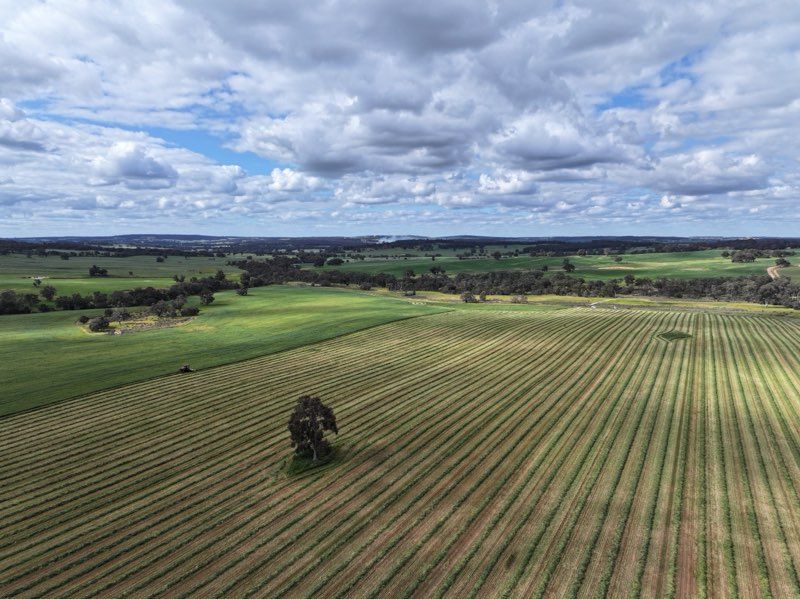Hi. I’m Oli Harding, a farmer from Williams in Western Australia, roughly 140km south-east of Perth. Our farm has been family-run since 1959, initially as a livestock operation, but we have now diversified into the production of hay and grain.
In 2023, I moved back to the farm, working on the farm with my parents, Simon and Bronny. More recently, my partner, Soph, moved to the farm, so I am excited to see what the future holds.
Across the two properties that comprise our operation, we farm approximately 3,300 ha, primarily on forest gravels and sandy duplex soils. The majority of the farm, 2,800 ha, is planted with crops, including GM-free canola, oats, barley, wheat, and lupins.
The cropping side of the business has enabled us to operate a hay and grain business, known as Narrakine, a globally recognised brand that exports to Japan, China, Taiwan, Korea, and Europe. Narrakine annually exports over 50,000 tons of hay and 3,000 tons of grain into these international markets.
The remaining 500ha of the farm are left as pasture for the sheep operation. The sheep operation trades roughly 14,000 lambs throughout the year. The majority of these lambs are then inducted into our feedlot; operating under the name ‘Mottainai.’ On our property the production of Mottainai lamb started in 2024; aiming to provide the highest quality marbled lamb to high end markets both in Australia and overseas. Through a mixture of carrots, hay, grains and patented feed rations the feedlot aims to produce lamb with an intramuscular fat score of about 25-30%.

In terms of rainfall, we typically receive an annual average around 450mm, and this year have currently received 315mm, which is well below our usual expectation. While the rainfall is below average, the season is looking promising. The early rain in March and April allowed us to get a good start to the season, getting an early germination on the canola and some cereals. To an extent, the lower rainfall years tend to be our better performing, as we lose less land to waterlogging and have improved conditions for haymaking.
It is pretty quiet on the farm now, as all the paddock work is wrapped up. I’ve been spending time in the sheds getting the hay cutters, balers and rakes ready for haymaking. Other than that, I have been doing a bit of fencing and drafting off the remaining sheep to destock before we buy in new season lambs.
My parents have always taken a proactive approach to our farming operations, working with industry groups and organisations and collaborating with national trial companies to continually improve the way we do business. Our outlook on farming is one of sustainable production within an environmentally aware approach. My parents have instilled in me a deep respect for the land and the environment.
Like other growers, one of the challenges we face is effectively dealing with weeds. With such a heavy hay rotation, we have forced ryegrass, silver grass and wild oats to senesce early, dropping seeds before cutting. This approach makes it difficult to control weeds in season, so we are trying to move to a 3-year gap rotation, which involves a rotation of hay, canola, barley, pasture, or lupin to introduce new chemistry and kill weeds – along with investing in technology such as seed destructors.
As a young grower, I see opportunities for growth with the introduction of new technologies. I can see swarm farming playing a larger role in our area, with smaller machines operating at greater numbers rather than buying bigger and bigger machinery to meet efficiency demands. I think drones will be a starting point, having multiple drones autonomously spraying or spreading. At present, precision agriculture is quite challenging to implement on our property, as trafficability is a significant issue, with numerous obstacles limiting what, where, and how we operate.
The question of pride in our industry is an interesting one. I have been fortunate to grow up in farming and be involved in a business that has that pride in the way we do things and the quality products we deliver to our customers. I am proud to be an Australian grain grower as we have some of the oldest, most infertile soils in the world. Despite this challenge, we manage to successfully grow crops year in year out due to innovation and the willingness to adapt.
